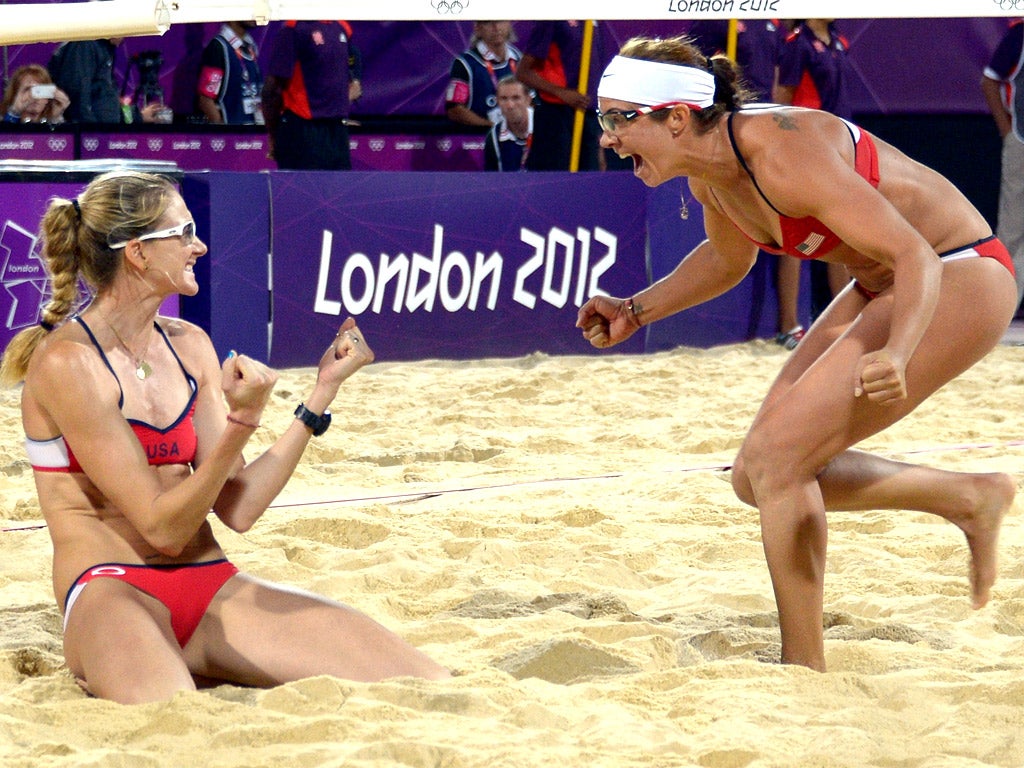British volleyball's future built on more than sand
Both the indoor and much-trivialised beach version of the sport can prosper after the Games

Beach volleyball is coming to a sandpit near you. Or at least it is if you live within the M25. Five thousand tons of sand that formed the main arena and practice courts at Horse Guards Parade are on their way to as many as 30 sites within London's perimeter artery. The sand was hewn from a quarry in Surrey and would have been going back there were it not for the quick thinking of British Volleyball president Richard Callicott, who agreed a deal to ship it out to new courts at a cost cheaper than the return fee.
Appropriately enough for a sport with coastal associations, beach volleyball and its sister sport are riding a wave of unprecedented popularity thanks to these Games. London, particularly the Horse Guards location, has added a level of stately exotica beyond even the scope of Bondi in Sydney. The beach is all well and good but what do you do when the tide is out. Fire up the barbie, buy another ice cream, stick of rock? No thanks. The game has moved on and with its clever positioning in the heart of one of the great cities this minority sport has been given a significant leg-up.
The previous afternoon David Cameron dropped by with his wife and kids, adding to the sense of euphoria projected by the British Federation, which estimates more than a million people will have attended both versions of the discipline in central London and Earls Court by the tournament's end. For a sport that did not have even have a British governing body when London won the Games, these are heady days. And when the next round of funding is decided in December it won't hurt to lean on Cameron for a testimonial.
Volleyball took £4m in funding from the last UK Sport divvy. It sounds plenty but the start-up costs swallowed most of it, leaving the elite athletes with grants of only £6,000 a year, a trifle compared to other elite programmes. Britain's top boxers, for example, might collect almost seven times that. "What we have to do next is convince UK Sport that this is a serious sport and should be recognised as such. It has taken cycling 12 years, and what a success they have had. Swimming has had 12 years. What we need is a consistent level of funding over a prolonged period like those other sports," Callicott said.
"Most of the £4m went on infrastructure. When London got the Games we had a home nation spot. We then had to convince the British Olympic Association that we could compete with credibility. We have done that. There was no structure. We had no funding. We became a federation only in 2005. We then had to appoint staff and coaches, find offices, identify players then pull it all together."
The case for volleyball is the same made by other marginal sports given a platform by the Games. Handball, performing to packed houses in the Copper Box, and water polo are easy-access disciplines that also have huge traction on the Continent and are keen for a greater share of the UK talent pool. What neither has is the obvious attraction of outdoor participation and beautifully athletic women in swimsuits to sell it.
The danger of trivialising beach volleyball in the trade for publicity is a risk Callicott is happy to take. "We picked up in the last five months three sponsors worth about £90k. I'm hoping that the raised profile through this Olympics, which already has greater viewing figures than Beijing, will get people to recognise that this is a genuine Olympic sport, worth investing in. It has no downside.
"We talk about player pathways and development. That just didn't exist. Now they do. We have more than 1,500 schools playing, youth clubs and national leagues, regional leagues and local leagues. The parodies projected by people that think they are funny are grossly insulting but if you rise to them you substantiate them. I take them with a sense of resignation. The cheap, sensationalism demonstrates that they don't really have a point to make and if they think this is trivial nonsense they can come and give it a go."
The British women won one of their three pool games; the men none. Without exception, the players arrived at volleyball's door anecdotally via an enthusiastic PE teacher or some other point man. The plan is to progress through the groups in Rio and win a medal in 2020. Performance shortfall did not appear to have a detrimental effect on the watching experience last night. Hold the tittering, please. Brazil's women edged China to claim bronze before the Americans did battle against each other for gold.
Subscribe to Independent Premium to bookmark this article
Want to bookmark your favourite articles and stories to read or reference later? Start your Independent Premium subscription today.

Join our commenting forum
Join thought-provoking conversations, follow other Independent readers and see their replies